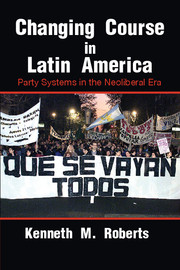Book contents
- Frontmatter
- Dedication
- Epigraph
- Contents
- List of Figures
- List of Tables
- Preface and Acknowledgments
- List of Abbreviations
- 1 Introduction: Party System Change in the Neoliberal Era
- Part I Explaining Regional Patterns
- 2 Partisanship and the Puzzle of Party System Stability
- 3 Critical Junctures and Party System Change
- 4 Antecedent Conditions: Party System Differentiation in 20th-Century Latin America
- 5 Neoliberal Critical Junctures and Party System Stability
- 6 Programmatic (De-)Alignment and Party System Stability in the Aftermath Period
- Part II National Experiencesin Comparative Perspective
- Appendix Election Results in Latin America
- References
- Index
4 - Antecedent Conditions: Party System Differentiation in 20th-Century Latin America
Published online by Cambridge University Press: 18 December 2014
- Frontmatter
- Dedication
- Epigraph
- Contents
- List of Figures
- List of Tables
- Preface and Acknowledgments
- List of Abbreviations
- 1 Introduction: Party System Change in the Neoliberal Era
- Part I Explaining Regional Patterns
- 2 Partisanship and the Puzzle of Party System Stability
- 3 Critical Junctures and Party System Change
- 4 Antecedent Conditions: Party System Differentiation in 20th-Century Latin America
- 5 Neoliberal Critical Junctures and Party System Stability
- 6 Programmatic (De-)Alignment and Party System Stability in the Aftermath Period
- Part II National Experiencesin Comparative Perspective
- Appendix Election Results in Latin America
- References
- Index
Summary
Party system change during the transition from ISI to neoliberalism cannot be understood merely by analyzing political alignments and events during the critical juncture itself. Neither can it be understood by examining national cases in isolation from others. A comparative perspective suggests that different countries entered the transition period with distinct antecedent conditions that shaped their respective critical junctures. As such, the causal chains that produced the divergent political outcomes of neoliberal critical junctures can be traced back to development patterns during the ISI era – that is, to the institutional legacies of the earlier, labor – incorporating critical junctures that ushered in the era of mass politics in Latin America.
This chapter and the next explore the party system effects of these two critical junctures. They trace the development of elitist and labor-mobilizing (LM) party systems following the first critical juncture, locate them within their different political economies, and explain why the LM cases were susceptible to more severe political and economic crises during the transition to market liberalism. These two critical junctures demarcate three distinct eras of socioeconomic and political development in Latin America, each of which possessed an alignment of states, markets, and societal actors that shaped national party systems. The first of these alignments, the oligarchic order, was characterized by elite political domination, commodity-export development models, and exclusive, oligarchic party systems. This order prevailed from independence in the early 19th century until the early decades of the 20th century, when industrialization, labor mobilization, and eventually the Great Depression undermined oligarchic rule and launched a new era of mass politics. This critical juncture led to the emergence of what Cavarozzi (1994) calls the state-centric matrix, which was characterized by state-led industrialization, corporatist patterns of interest intermediation, and the formation – in part of the region – of mass parties with programmatic linkages to organized labor.
- Type
- Chapter
- Information
- Changing Course in Latin AmericaParty Systems in the Neoliberal Era, pp. 65 - 88Publisher: Cambridge University PressPrint publication year: 2015



